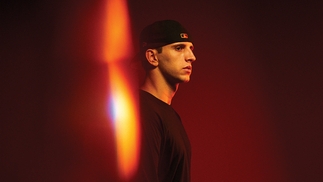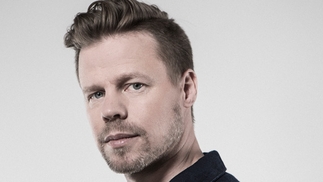THOMAS GOLD: PURE GOLD BELIEF
The German producer reflects on his plight to becoming the in-demand DJ he is today and the importance of keeping true to what he most believes...
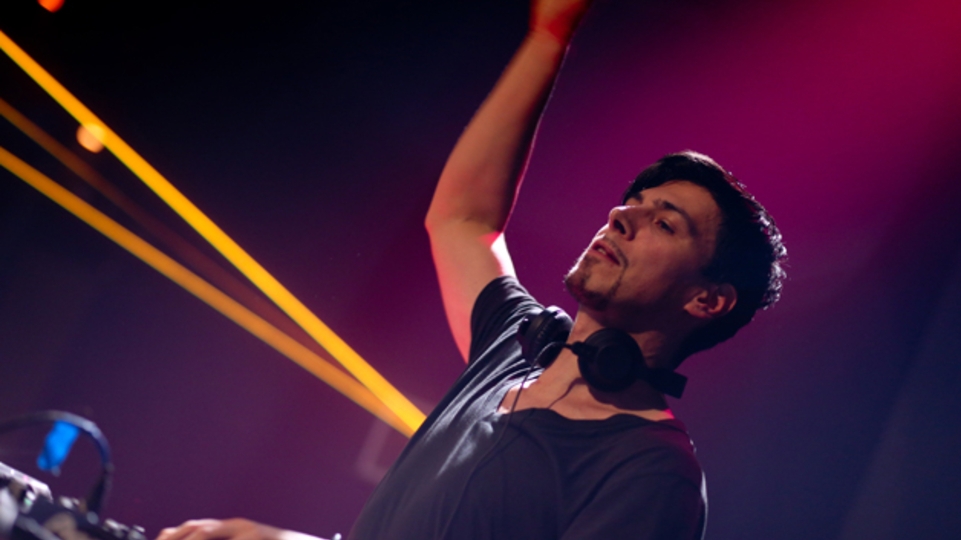
“Actually, this is one of my most productive years so far.” Thomas Gold smiles broadly into the camera, his face framed by simple, black-rimmed glasses. It’s clear he’s having a good 2015.
We return the smile, because it is impossible not to reciprocate happiness when speaking with the German native. His good-natured charm is infectious, a refreshing change of pace in an industry rife with brooding artists. Always smiling, Thomas peers at us intently on a Skype screen, 4,500 miles away from his home studio in Berlin.
“This basement of our house, it’s actually the place where I create and mix and master all my stuff,” he gestures, trying to move the camera around to show off the full scope of the space. Technology does not feel like cooperating. We catch a pixelated glimpse of an immaculately clean room, two bookcases in the background neatly lined with vinyl and two sets of unplugged monitors resting on top of them.
“I have these keyboards here and the analog gear and speakers are right behind the camera; sorry I can’t show you,” he laughs. “This is my perfect workspace. I spend so much time here. It’s where everything happens.”
By everything, of course, Thomas Gold means the endless hours of music he has created, and continues to create. While he burst onto the American scene in a very visible way in 2012, entering the DJ Mag Top 100 at #82 thanks in large part to his hit remix of Adele’s Grammy-winning power ballad ‘Set Fire To The Rain’, he has been churning out tracks since as early as 2003.
And not just a few cuts a year.
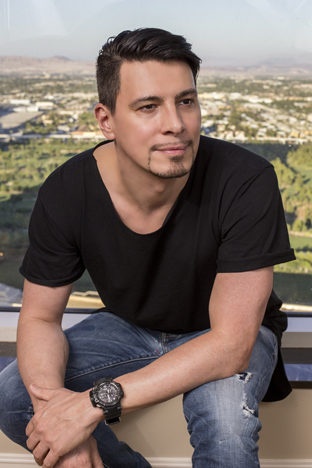
THAT PROGRESSIVE SOUND
A quick Google search will put things into perspective: From 2006-2008 alone, Thomas released over two dozen remixes. In 2009 Beatport nominated him Best Progressive House Artist; and in 2010, Axwell named him Breakthrough DJ/Producer in DJ Mag. That same year, he joined Toolroom Records as both an artist and resident DJ for Toolroom Knights and inserted himself into the playlists of the commercial elite: Tiësto, Chuckie, David Guetta, Sander van Doorn, and the Swedes -- Axwell, Ingrosso and Steve Angello.
“I think the point where everything changed for me was when I had my track ‘AGORa’ signed to Size Records in 2011,” Thomas recalls. “Steve Angello signed this track. It was kind of a new approach for me, sound-wise.”
Angello’s brother, AN21 (pronounced Antoine), heard Thomas playing the track in a club and approached him in the booth, asking what it was. When Thomas explained that it was a new song he was working on, Antoine instructed him to send it to him at Size Records, immediately.
“And they signed it and I was like, ‘Oh fuck, I got a release on Size Records. How cool is that?!’” Thomas exclaims, laughing as he remembers the shock of the moment. The support of the Swedish label not only gave Thomas the timely boost he needed, but it helped steer him in a direction that would ultimately lead him to the top of the charts.
“That really gave me the motivation to continue with that sort of progressive sound. I got rid of all the other stuff I had done before,” he says, his tone turning serious as he describes the transition. Shortly after his release on Size, Thomas worked on a collaboration with Axwell, and after that the remix for Adele. This turn of events coincided with a distinct shift in his sound and marked a new era for the artist.
“I really felt like I fit well in that zone, that this was my music,” he emphasizes. “I loved the sound and I loved the groove and I got a lot of support from other artists.”
WE DON’T NEED YOU ANYMORE
While support wasn’t always there from other artists, support at home was. His mother piqued his musical curiosity at age seven when she took him to see a Yamaha keyboard demo. As sure of what he wanted then as he is now, Thomas pointed at the instrument and informed her that he wanted one. There was no musical background in his family, but his fascination with music was apparent. His parents purchased a small electronic organ and set up their eager son with lessons.
“I won some competitions for organ players as a kid. Just in Germany, you know,” Thomas looks down modestly recounting his earliest memory of musical success with the same humility he affords his current achievements.
“I was always just very interested in music. When I grew up I was like, ‘Okay, I want a synthesizer now.’ I heard this electronic music thing, this house music, and thought, ‘I need to do these kinds of sounds.’”
Armed with a Yamaha DX-11, at age 15 the adolescent, born Frank Thomas Knebel-Janssen, began his journey toward becoming the DJ known as Thomas Gold.
“I got my first residency at a local club when I was 18. That lasted two days. They got rid of me the next weekend,” Thomas laughs, shaking his head.
“I just had a bad first night. I think it was New Year’s Day. The club was half empty. I really struggled,” he remembers. “It was my first real job in a club and the next weekend when I showed up the guy was like, ‘Oh, you’re here? Sorry I didn’t call you. We don’t need you anymore.’”
He smiles in hindsight at the hiccup and explains that he used it as motivation to improve, staying out of the clubs for a year before re-emerging more prepared. He eventually found another local residency, where they kept him on for more than a weekend.
There’s nothing like the sting of rejection to push an artist to new heights, but Thomas Gold credits Chicago house and its legends like Steve “Silk” Hurley with his earliest musical inspiration. True to form, the first piece of vinyl he ever purchased was ‘Love Can’t Turn Around’ by Farley Jackmaster Funk.
He points to the records lining the shelves on the wall behind him: “I got rid of a lot of vinyl because it eats up so much space. But I wanted to keep my gems, the stuff I really loved to play, like ‘Finally’ by CeCe Peniston. You know that one?” he grins. We presume he’s being sarcastic, but the dry, German humor makes it hard to tell.
“The thing was, it was not easy to reproduce that sound on cheap equipment!” Thomas insists. “With just a synthesizer that didn’t work at all ... what I did sounded so, SO far away from these records.”
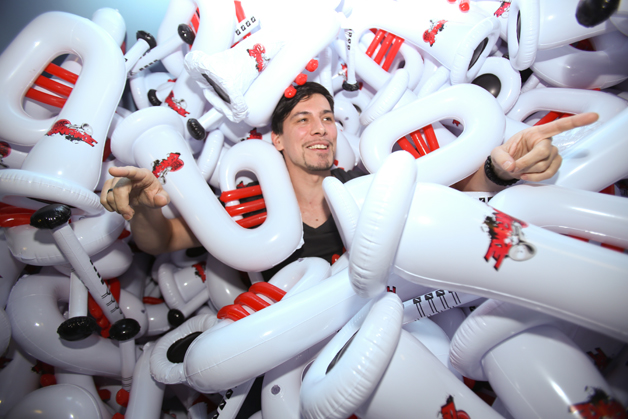
BIG BAD DRUMS
What he was unable to recreate in his early days with a meager Yamaha synthesizer, he has atoned for in creativity today. In addition to a multitude of releases that span numerous genres, Thomas Gold has managed to put together one of the most innovative experiences in dance music: incorporating a live drum line into his sets.
It began at a show on Governors Island in New York, in 2012.
“One day I just had this idea of bringing live instruments on stage, to have people playing with me. It seemed obvious to have big drums because with a DJ set, it doesn’t really work out if you have a flute player,” Thomas laughs. “Drums are big and punchy and powerful.”
When he learned that nearly every major university in the cities he played in had its own drum line, Thomas knew he had found his new gig-mates. Determined as he was at age 7 after setting his sights on his first keyboard, he sent his manager a video of a drum line and explained that it was exactly what he wanted to use. Together, they contacted a local New York City drum line and began coordinating with the group’s coach. No one knew how it would sound; it had never been done.
“I picked three of my tracks and sent these to the coach. They started writing drum tracks on top of my stuff; doing rough recordings of what they had in mind and sending them back to me. They didn’t just play my stuff; they did an interpretation of my music. It was really great,” Thomas recalls.
The coordination and effort involved in planning the show was intense, but it paid off. The Governors Island crowd, although unsure of what exactly to make of the bizarre new scenario at first, loved it, and Thomas knew he was on to something.
“It was so much fun. These drum line guys were so excited and so into it, you could really feel the energy. They had never played in front of such a large crowd before. It was just amazing.” Thomas pulled off two more drum line extravaganzas, one in Las Vegas at EDC and one again in New York City, at the historic Roseland Ballroom. He hints that there may be more to come.
“Maybe in the future, I’ll do it again. Maybe with a twist,” Thomas raises an eyebrow mischievously. “I have a couple of ideas. I just don’t want to repeat the same thing again. So yeah ... let’s see.” He folds his hands and sits quietly, not saying another word on the matter, suggesting that the fans -- and drummers -- will just have to wait for the maestro’s next move.
JUST BELIEVE
The persistence of vision that allowed Thomas Gold to pull off a live drum line for 13 minutes of some of his biggest sets is the same thing that has kept him in the upper echelons of the dance music world ever since he broke through its door. It also likely helps him maintain a positive outlook about the state of the scene at the point in a career where jadedness tends to start seeping in.
“There’s some really exciting stuff going on right now,” he explains. “The way you produce music has evolved. It’s not just about getting a laptop and Logic and some plug-ins. It’s more about creating melodies and tweaking sounds on a very subtle basis. That’s what I really love.”
His new and upcoming productions reflect that attention to subtlety, despite their comfortable fit in big room playlists. ‘Believe’, just released on Hardwell’s Revealed Recordings as a follow up to last year’s ‘Colourblind’, features vocals from Bright Lights and the soaring, emotional breakdowns that fans have come to expect from Thomas Gold productions. Those breakdowns, he explains, are something he took away from his work on the remix of Adele’s ‘Set Fire To The Rain’.
“Adele gave me inspiration about the breakdown sections in tracks,” he says. “What she does is kind of commercial but it’s not cheap stuff. It has a lot of soul and emotion. That emotional aspect of her breakdowns has inspired me a lot.”
That inspiration shines through even more clearly on an upcoming collaboration with young Italian duo Lush & Simon called ‘Morphine’. The sound is reminiscent of early 2000s trance, with goose bump-inducing builds and melodic riffs that possess a cinematic quality -- another element that Thomas says he consciously builds into his music. Perhaps it’s no wonder then that Dutch maestro Armin van Buuren loves the track so much, he personally signed it to his Armada imprint’s sub-label, Armind.
With upcoming releases on Armada, Revealed and Protocol, residencies in Las Vegas at LiFE and in Miami at Story and LIV, it’s clear that Thomas is a DJ in demand. And just in case his busy tour schedule and slate of releases weren’t enough to satiate supporters, he’s also partnered with DJ Mag for an exclusive competition that will offer a few lucky fans the trip of a lifetime: accompany Thomas Gold on tour and film him as he preps, plays, and jets from one gig to another.
Despite the seemingly endless whirlwind of success, Thomas suggests that patience is the real key to happiness. “I always say be patient. Some things just take a lot of time. It’s a lot of work ... you have to go through a process. I’m of the opinion that you need to keep trying. Don’t lose faith in yourself.”
He smiles into the camera again, remembering to mention the woman who put him in front of his first instrument, all those years ago: “It was such an important thing that my mom told me, ‘Hey, I believe in you. Whatever happens, we will support you. Whatever you need, you can come to us and we will help you.’ And [my parents] helped me and you know, they NEVER told me this was the wrong decision. Now they’re super happy to see what’s going on. I’m just so grateful.
“That’s my advice to anyone -- just believe in yourself,” Thomas insists, echoing the lyrics of his latest release. “Even if it’s sometimes hard, be patient. Nothing comes by itself.”
